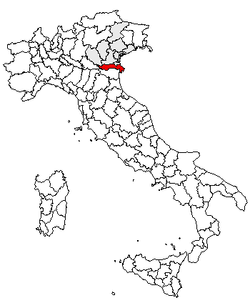User:Achillu/Sandbox
Province of Rovigo | |
|---|---|
|
Coat of arms of Province of Rovigo Coat of arms | |
 Map highlighting the location of the province of Rovigo in Italy | |
| Country | |
| Region | Veneto |
| Capital(s) | Rovigo |
| Comuni | 50 |
| Government | |
| • President | Federico Saccardin |
| Area | |
• Total | 1,789 km2 (691 sq mi) |
| Population (2005) | |
• Total | 244,625 |
| • Density | 140/km2 (350/sq mi) |
| Time zone | UTC+1 (CET) |
| • Summer (DST) | UTC+2 (CEST) |
| Postal code | 45100, 45010-45039 |
| Telephone prefix | 0425, 0426 |
| Vehicle registration | RO |
| ISTAT | 029 |
The Province of Rovigo (Provincia di Rovigo) is a province in the Veneto region of Italy. Its capital is the city of Rovigo. It borders north with the provinces of Verona, Padua and Venice, south with the province of Ferrara and west with the province of Mantua. It borders east with the Adriatic Sea.
Geography and demographics
[edit]The province of Rovigo corresponds with[1] or is full included into[2] contemporary Polesine. It has an area of 1,789 km² and a total population of 244,625 inhabitants (2005). It is a plain whose elevation is from -2 m to 15 m[3].

The northern border is set on the Adige river from Badia Polesine to the sea, except for the territory of Cavarzere (in the province of Venice); the southern border is set on the Po river from Melara to the sea. The province includes the whole delta of the Po and the border is set on the Po di Goro channel of the delta.

The rivers Po and Adige have had a stable course only in recent times. The land is of relatively recent formation, created by drifts taken by the rivers, and subsidence occurs due to natural consolidation as well as to human activities such as drainage, groundwater extraction and methane extraction[4].
The Canal Bianco is the only other river that flows across the province. Many canals for drainage have been dug in the province of Rovigo because the Po and the Adige are the first and the third biggest rivers of Italy as for rate of flow and the land has a huge amount of water to deal with; the main canals are Collettore Padano, Scolo Ceresolo and Scolo Valdentro.
Other streams of historic importance are the Naviglio Adigetto (a former course of the Adige), the Scolo Poazzo (a former course of the Po) and the Fossa Polesella (a former waterway connecting the Canal Bianco with the Po).
The climate is mild continental with high humidity
There are 50 comuni (singular: comune) in the province[1]. As of june 30, 2005, the main comuni by population are:
| Comune | Population |
|---|---|
| Rovigo | 50,922 |
| Adria | 20,593 |
| Porto Viro | 14,484 |
| Lendinara | 12,198 |
| Badia Polesine | 10,741 |
| Occhiobello | 10,621 |
| Porto Tolle | 10,377 |
| Taglio di Po | 8,389 |
| Rosolina | 6,304 |
| Villadose | 5,285 |
The various towns and villages are due to be connected by the Strada Statale 434 "Transpolesana"[a], a long highway planned to cross nearly the entire province; right now it connects Verona just with Rovigo. A13 toll motorway, connecting Padua with Bologna, and Strada Statale 309 "Romea"[b], connecting Venice with Ravenna, pass through the zone. It has some famous holiday villages, as Rosolina Mare, Rosa Pineta, and Albarella Island (Isola di Albarella in Italian).
History
[edit]The territory of the province was first colonized by the Greeks, who founded in the XII-XI century b.C. the colony of Adria. During the VI and V century b.C. Etruscans and Venetians inhabited the area, followed by the Romans.
In the Middle Ages the Este were the rulers, but anyway the territory was not an administrative unit of the duchy; more than one Podesteria was even set over both sides of the Po river.
After the War of Ferrara in 1484 the Republic of Venice started ruling over the northern part of Polesine; the Venetians set it as a territorio whose capital was Rovigo, thus giving the area an administrative unity for the first time. This can be viewed as the start of the province of Rovigo, though the extension was a bit less than nowadays because the borders were set on the Tartaro-Canalbiano river with few exceptions: the territories of Polesella and Guarda Veneta and the delta of the Po were included in the Venetian territorio of Rovigo.
After the Congress of Vienna in 1815 all the territories to the north of the Po were included into the Kingdom of Lombardy-Venetia, thus giving the province of Rovigo the extension it has nowadays.
Agriculture highlights
[edit]Agriculture thrives in the province of Rovigo, particularly the cultivation of sugar beets, maize and vegetables.
Delta and nature delta park
[edit]The eastern portion of the province corresponds with the delta of River Po, a large area where the river subdivides into channels (each with its own name). The delta is also a protected area, because it's a national-legally recognized nature park.
Notes
[edit]- ^ State Road 434; the proper name "Transpolesana" means "through Polesine".
- ^ State Road 309 "Romea".
References
[edit]- ^ (in Italian) "polesine", Il Vocabolario Treccani, Rome: Istituto della Enciclopedia Italiana, 1992
- ^ (in Italian) "Polesine", Sapere.it, vol. Enciclopedia Generale, Novara: De Agostini, 2002
- ^ All demographics and other statistics: Italian statistical institute Istat
- ^ (in Italian)
"Rovigo (provincia)", Sapere.it, vol. Enciclopedia Generale, cit.
{{citation}}: Italic or bold markup not allowed in:|publisher=(help)
See also
[edit]- Bishopric of Adria for ecclesiastical matters
External links
[edit]- (in Italian) Provincia di Rovigo homepage

